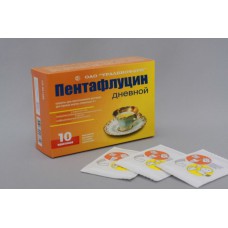Expiration date: 04/2026
Characteristics: form of issue, composition
Granules Pentaploid day for solution for the reception inside different shape and size: round, cylindrical or irregular in shape, white, white-yellowish and yellow-green.
1 sachet:
- ascorbic acid 200 mg
- calcium gluconate monohydrate 200 mg
- caffeine monohydrate 20 mg
- paracetamol 500 mg
- rutoside (in the form of trihydrate) 20 mg
Excipients: povidone 17.4 mg, sugar 3.9426 g, saccharin 50 mg, citric acid 50 mg.
Pharmgroup: ARI and" cold " symptoms remedy (analgesic non-drug+psychostimulatory agent+H1-histamine receptor blocker + vitamin)
Formdata: Pentaploid day - combination drug that has analgesic and anti-inflammatory effect.
Paracetamol has antipyretic and analgesic effect. Non-narcotic analgesic, blocks COX-1 and COX-2 mainly in the Central nervous system, affecting the centers of pain and thermoregulation. In inflamed tissues, cellular peroxidases neutralize the effect of paracetamol on COX, which explains the almost complete absence of anti-inflammatory effect.
Ascorbic acid plays an important role in the regulation of oxidation-reduction processes, carbohydrate metabolism, blood coagulation, tissue regeneration, increases the body's resistance.
Calcium gluconate is a regulator of calcium and phosphorus metabolism.
Rutin reduces the permeability and capillary fragility, has antioxidant properties.
Indications: Pentaploid day used in adults for the symptomatic treatment of acute respiratory infections (ARI) and acute respiratory viral infections (ARI), fever, chills, headache and muscle pain.
Category effects on the fetus: use of the drug Pentaglycine day during pregnancy and lactation is contraindicated. If necessary, use of the drug during lactation to stop breastfeeding for the entire period of treatment.
Contraindications:
- hypersensitivity to the drug Pentaglycine day,
- expressed violations of liver or kidney function,
- blood diseases with a tendency to hemorrhage,
- glucose-6-phosphate dehydrogenase deficiency,
- children's age (under 18 years),
- congenital intolerance to fructose, glucose-galactose malabsorption, sucrose-isomaltase deficiency.
With caution:
With Gilbert's syndrome (constitutional hyperbilirubinemia).
Dosing: Pentaploid day applied inside after eating 1 tea bag 3-4 times/day for 3-5 days.
The contents of one sachet of the drug dissolve in 1/2 Cup (125 ml) of hot water (t=70°C) and drink. Allowed a slight precipitate in a glass. Use freshly prepared solution. Shake before use.
Side effects: in the recommended dosage, side effects are rare.
Sometimes it is possible the occurrence of skin allergic reactions, nausea, vomiting, headache, General weakness, dizziness.
Ascorbic acid:
From the urinary system: moderate pollakiuriya (when taking doses of more than 600 mg / day), with prolonged use of high doses - hyperoxaluria, nephrolithiasis (calcium oxalate), damage to the glomerular apparatus of the kidneys.
From the digestive system: irritation of the gastrointestinal mucosa.
Allergic reactions: skin rash, skin hyperemia.
Other: inhibition of the function of the insulin apparatus of the pancreas (hyperglycemia, glucosuria).
Calcium gluconate:
From the digestive system: constipation, irritation of the gastrointestinal mucosa.
Caffeine:
From the nervous system: excitement, anxiety, tremor, anxiety, headache, dizziness, increased reflexes, tachypnea, insomnia.
From the cardiovascular system: heartbeat, tachycardia, arrhythmia, increased blood PRESSURE.
From the digestive system: nausea, vomiting, acute peptic ulcer.
Paracetamol:
From the digestive system: nausea, epigastric pain.
From the hematopoietic system: anemia, thrombocytopenia, methemoglobinemia.
Allergic reactions: skin rash, itching, urticaria, angioedema.
With long-term use in high doses, hepatotoxic and nephrotoxic action is possible.
Rutoside:
Allergic reactions: skin rash
From the digestive system: nausea, diarrhea, heartburn.
From the nervous system: headache.
From the cardiovascular system: "tides" of blood to the face.
If any of the side effects listed in the instructions are aggravated, or you notice any other side effects not listed in the instructions, tell your doctor.
Overdose: Symptoms (due to paracetamol): during the first 24 hours after administration - pale skin, nausea, vomiting, anorexia, abdominal pain, glucose metabolism, metabolic acidosis. Symptoms of liver dysfunction may appear after 12-48 hours after an overdose. In severe overdose-liver failure with progressive encephalopathy, coma, death, acute renal failure with tubular necrosis (including in the absence of severe liver damage), arrhythmia, pancreatitis. Hepatotoxic effect in adults is manifested when taking 10 g or more.
Treatment: the victim should do gastric lavage, prescribe adsorbents (activated charcoal) and consult a doctor.
Symptomatic therapy: introduction of aid donors SH-groups and precursors of the synthesis of glutathione - methionine for 8-9 hours after the overdose and acetylcysteine within 8 h. the Need for additional therapeutic measures (further introduction of methionine, in/in the introduction of acetylcysteine) is determined depending on concentration of paracetamol in the blood, and the time elapsed after its reception.
Interactions: avoid combination of the drug with barbiturates, anticonvulsants, phenytoin, carbamazepine, rifampicin, zidovudine and other inductors of microsomal liver enzymes.
Special instructions: the drug pentaglycine the day included sugar (1 sachet contains sugar 0.33 HEH) that should be considered for patients with diabetes.
To avoid toxic liver damage should not be combined with the use of drug alcohol.
During treatment should observe caution while driving vehicles and occupation potentially hazardous activities, require high concentration and psychomotor speed reactions.


